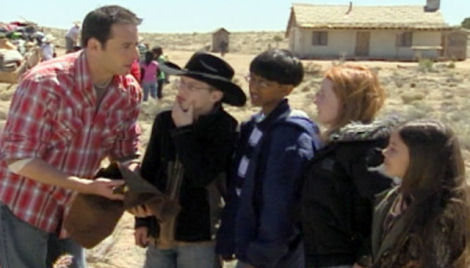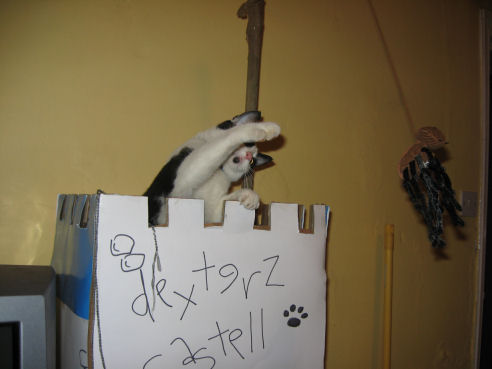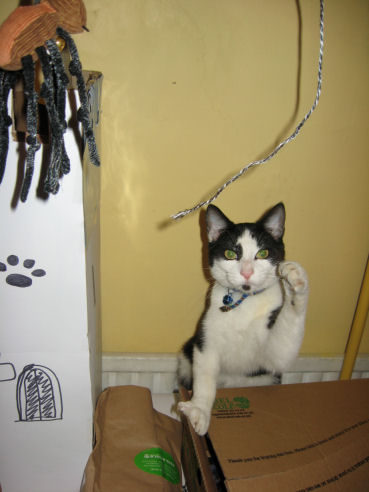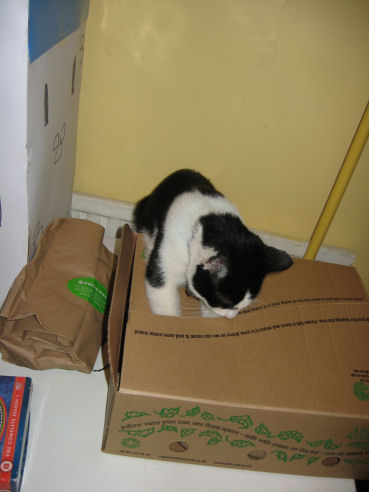Journeyman – NBC
by John Walker on Oct.05, 2007, under Television
Sometimes a new TV show starts, and everyone resorts to a lazy comparison with something from the past. And sometimes it’s completely valid. Journeyman is desperately waterskiing behind the Quantum Leap boat. Except, oddly, it’s nothing like it.
Quantum Leap plot: Man leaps through time into other people’s bodies, to put right what once when wrong, then leaping to the next person, in the next time period.
Journeyman plot: Man leaps through time in his own body, through various periods of a person’s life, putting right what maybe went wrong, or something, they don’t seem sure.
The problem is his helplessness. Dan Vassar’s Kevin is our portal for the programme, and he’s pretty much a bystander in all that happens. Which means so are we, staring at what seems like unwinding inevitability. For example, in episode two he first finds himself no longer on an aeroplane with his wife, but instead on one in the early 80s, filled with people smoking, kids with toy guns, and flirtatious flight attendants – look, it’s the past! He helps a woman who goes into labour, and then finds himself back in the present. Next he’s in the thick of the 80s, and meets the mother again. She’s debating whether to tell her daughter about her father. Then we’re in the 90s, and we’re with the teenage daughter confronting the father. And then it’s ’97 and he’s back on a plane, meeting the estranged and mean father, who has leukemia and needs a transplant. So we’re soon with the daughter again, and bringing her to meet her father again. And done.
Kevin certainly helps – he says the right thing in the few moments he has. But he doesn’t pick the moment, and he certainly doesn’t have time to think about what he might do. In the end he makes spur-of-the-moment binary decisions – be helpful or unhelpful – and the bounces home.
There’s all sorts else going on. There’s his missing-presumed-dead fiance, who appears to be following him on his “leaps”, there’s his current wife and son and their issues, and there’s the rather big problem of his constantly disappearing. And it’s in this that Journeyman has some success. So often in mysterious fantasy programmes, the protagonists’ oddities are madly ignored. Here his wife can’t deny what’s going on – especially when he vanishes from a flight. And gracefully, she accepts the impossibility of her husband’s newfound ability to time travel. Plus there’s the logistics of it, like the troubling nature of heightened airport security for a man who gets on a plane, but doesn’t get off. Or disappearing from the driver seat of your car as you’re going 30mph.
It’s a nice show, with a decent cast. But it’s forgotten something rather crucial – to have a point. So yes, he helps people out. But why? We never knew who leapt Sam Beckett, but we at least knew he stepped into the Quantum Leap Accelerator and vanished. And what’s the dramatic tension of the episode? What if he doesn’t do the right thing in those few minutes he’s with someone? Does he get stuck? Die? We can’t ever find out, because if he did so, the show would be over, him trapped in the past. So instead we have to assume his guesses are correct, as he helplessly stumbles through someone’s life. There’s never any mention of the paradoxes of time travel, never any concern over his changing the past (with him merrily crashing his own life whenever he gets the chance). There’s far more emphasis on the problems his time travel causes his personal life than there is of the journeys themselves. And that’s presumably because it’s impossible to write a proper story when he’s aimlessly flipping back and forth against his own will. So in episode one he – wait, I can’t even remember a week later. And in episode two he inadvertantly gets someone to donate some bone marrow, so some guy who was nothing to do with the episode will go on to do some humanitarian work.
It’s as if the show got picked up on a format that sounded like it had a good hook, but in practise has nothing it can do with it. It’s certainly watchable, but more for the soap of his life, than for the show’s apparent premise.
Choose Your Own Dementia
by John Walker on Oct.04, 2007, under The Rest
I’ve been thinking about how I’d like to go A-Beautiful-Mind-style crazy.
Not that I’d like to, because it seems an awful lot of effort, but were I to, which way I’d like the mad to go. I think it’s something we all need to decide, before our brilliant brains go off the deep end.
So I’ve got it down to two schizophrenic flourishes.
A) I start to see patterns and clues in the 20-digit codes used for unlocking software on PC. The letters and numbers are not arbitrary as you might immediately think, but in fact messages for me, so I know what it is I am to do. YU00-MU5T-K11L-7H3M-4LLL.
B) As you walk around any town, you’ll see shop names and pub signs with letters missing. People might normally assume these to have been stolent by students on pranks, or simply to have fallen off or broken. But in fact I will recognise that these missing letters spell out important messages that I must decipher and interpret, in order that I can prevent the New World Order from taking over.
So, how you would like to go?
No More Love
by John Walker on Oct.03, 2007, under The Rest
Dexter now hates all of you, after none of the whining arseholes who blather on about wanting more Dex pics, nor anyone from the supposed Dex-loving World Of Stuart forum, could be bothered to leave him a birthday greeting. Apart from Lu-Tze and my 1 year old nephew, who managed.
You are ALL hated.
The Big Bang Theory – CBS
by John Walker on Oct.02, 2007, under Television
I mentioned this before when the pilot was generously made available to the viewing public by the kind folks of piracy. Now it’s real and proper and on television, and there’s been two of it.
Everything is wrong with this sitcom. The premise is so flimsy (two super-geeks live across the hall from a ditzy big-boobed blonde, and want to win her affections), the 1970s dynamic is dallying around sexism (super-intelligent guys compete to win dumb girl’s affections, girl has giant breasts, guys are nerdy and unattractive), and the gags involve missing trousers, walking into doors, and having difficulty moving heavy objects up stairs.
Which makes it hard to justify why I laughed all the way through both episodes. Well, it’s not hard. I just have to admit that either I’m an idiot for not seeing the levels it’s working on, or I’m an idiot for laughing at the bad TV show. In conclusion, I’m an idiot.
It’s written by sitcom writing vetern Chuck Lorre and former Henson cohort Bill Prady (who when he stood for governer of California, stated he’d “solve all the state’s problems in twenty-two minutes and forty-four seconds with two commercial breaks and a hug at the end.”). Two men who know sitcoms, even if they’ve spent most their writing in the middle-of-the-road, with shows like the occasionally sufferable Dharma & Greg, the horribly underrated Grace Under Fire, and one of the best sitcoms ever, Roseanne. So it’s all safely familiar.
The cast is more interesting, with sitcom regular Darlene’s “Johnny Galecki” BoyfriendfromRoseanne and the pretty much unknown Jim Parsons. Both are excellent, with fantastic deliveries, Galecki even getting away with a walking into a door gag thanks to pristine timing. The breasts are played by Kaley Cuoco, who is better known for voice acting in cartoons. Hopefully the hints in the first two episodes that she’s not completely stupid will blossom, and she’ll be given a slightly more rounded character than a Cheesecake Factory waitress who just broke up with her boyfriend. It’s telling from the all-male writing team that the only ways they’re able to create her character is defining her through relationships with men. She’s great in her part, and thankfully is bullish and strong despite the weakness in her lines.
If they can evolve their writing staff to a slightly more advanced state, and write Cuoco a distinct and interesting character, as rubbish as everything about the programme should be, this could creep into 3rd Rock From The Sun territory.
A Bucket O’French & Saunders – BBC
by John Walker on Oct.01, 2007, under Television
I adore French & Saunders. And I have no measure of whether that’s incredibly uncool, or enormously out of date, or something. But I adore them.
I love them because when working together, they’re incredibly funny. And because they’re astonishingly cruel. And cleverer than me. And I’m a bit in love with Jennifer Saunders.
Everything is meta. Layer on layer on layer. No sketch sits still, or stays in its place. They stay in character while stepping out of character. There is no defined position between sketch and sketch show, everything blurred, everything a television programme eating itself.
To understand their majesty, all you need to see is the Silence of the Lambs sketch.
Whether being Madonna and Britney, the stars of Alien, or a making-of documentary of the Harry Potter movies, they remain Dawn and Jennifer. Their accents may have changed, and indeed will likely change throughout the sketch, but it’s never about that which they’re spoofing. The Lambs sketch is purely about their being back for a new series, dressed in the lavishly complex clothing of a movie spoof.
These blurs nicely include Dawn’s size, somehow never impinging on her playing someone as thin as Britney Spears (well – back before Britney went saggy), but yet always being relevant. Not, “Ha ha! There’s a fat lady!”, but something smarter than that. Or as idiotic as French declaring, “That’s my big fat wobbly belly.”
Anyway, so they’ve got a full series of clip shows to celebrate 20 years on the BBC, with new material scattered throughout that’s just as great as they’ve always been. Seeing their awesome Silent Witness spoof, Witless Silence, again is such a joy. And best of all, it reminds you quite how silly they are. Astonishingly silly. Silly enough that a sketch can just be the two of them dancing stupidly, or shouting like children. But still smart.
And no, I didn’t think Ab Fab was very good, and the Vicar Of Dibley is like a tramp vomiting his liver in your face.
And Jennifer’s mother is a biology teacher in Cheshire.
Moonlight – CBS
by John Walker on Sep.29, 2007, under Television
What television needs is another show about vampires. Goodness knows there haven’t been enough yet, and goodness knows it’s important that they all be made with a budget of 10p and a cast of people you recognise from films you once saw on TV late at night.
Moonlight – the latest attempt to wring another drop of blood from the poor undead bastards – embraces everything at its very worst. Episode one is a cavalcade of awkward exposition. The episode begins with the central character, vampire private detective Mick St. John (played by Alex O’Loughlin, who peculiarly looks like a young Jon Stewart), explaining to an unseen television interviewer all about himself. Here he’s asked about all the various vampire details, and blithely dismisses various vampire rules so we know the score here. Crosses, holy water, garlic, and stakes through the heart can’t hurt him, and sunlight makes him feel ill. Turns out you can kill a vampire by setting him on fire, or chopping his head off. And then, oh the surprise, the interview is his own fantasy, and he tells us about his average day.
But the laboured exposition doesn’t end there. We have to see him injecting blood with a syringe, because he’s a good vampire, and therefore doesn’t drink the stuff like every other vampire in the universe. And we get to hear about how his life is about to change, because he saw a reporter on an internet site reporting on a murder.
Sophia Miles (cursed with small parts in vampire nonsense, from the BBC’s recent dreadful Dracula, to the abysmal Underworld sequel) plays Beth, said reporter, who decides the attacker of the murder victim must be a vampire due to the puncture marks on her neck. But she’s not a reporter for a TV channel! Oh no! This is the Noughties. She’s a reporter for an online news site called Buzz Wire, that looks like it was designed by MTV in 1987. In fact, it looks like that pizza commercial Winona Ryder’s film gets made into at the end of Reality Bytes. Her boss exclaims to her,
“200,000 unique visitors on your vampire story, and we posted less than 24 hours ago! The vampire angle was genius.”
Vampires, you say?
Buzz Wire has its own open-plan office filled with nu-media lovelies who get scoops over the television channels, because it’s all about the internet nowadays, someone once told the writers.
And so we are forced to accept that St. John and Beth will become teamed up and fight mysterious crime together. And that friendly vampires are everywhere. And people are interested in vampires but don’t know about them. And goths, called “emos” by the moronic writers, want to murder each other and become like vampires. And vampires. Vampires I tell you. Vampires.
Everything you’d assume a minimal-budget, yet primetime show would do wrong is here. Green-screened driving sequences, tacky beyond belief. Filmed like a soap opera. Incredibly claustrophobic small-set shots. And lots of sweeping, sped-up helicopter shots of cities, because Angel did that so then we’ll look like Angel.
Worst is the miserable attempt to include Whedon-esque banter. It’s just horrible. Everyone comes off sounding deeply smug, rather than witty, ensuring you hate everybody involved. And naturally it’s vital that we see Beth stripped down to her bra twice in the episode, and then drugged by evil men, and rescued by the good man.
Somehow it manages to be worse than cable attrocity Blood Ties, by failing to at least have the decent fight scenes. So naturally it will run for fifteen seasons, despite including narrative dialogue such as,
“Relationships are complicated. Vampire or mortal, that’s one thing we have in common.”
And it finishes with fucking Evanescence.
Kitchen Nightmares – Fox
by John Walker on Sep.28, 2007, under Television
Anti-Americanism in the UK is as rife now as it has ever been. People here talk about “Americans” in a way they would find abhorrent if supplanted by any other nation. It’s vulgar. And it’s not exactly helped by Fox.
Kitchen Nightmares – the Channel 4 series in which Gordon Ramsey visits failing restaurants, shouts at them for being idiots, changes their menu, hugs everyone when they make some money the next week, and then gets sued – has followed Hell’s Kitchen across the Atlantic and onto Fox’s main network channel. But, as is often the case, it’s gone under something of a transformation.
The UK’s Kitchen Nightmares is an oddly quaint programme. The restaurants he visits tend to be small, village projects, and supporting them seems almost philanthropic. (Obviously it isn’t – it’s to sell advertising – but the impression is nice). Also, you get to see morons shouted at by a frightening man, which is fun. At first this appears to have been kept intact. The first restaurant is a small Italian family business in a small town, the second a peculiar Indian-cum-American-cum-deathtrap in New York. The temptation to tackle big businesses was avoided, and mercifully.
But as you watch the first episode, the differences become quickly apparent. First of all, the US Hell’s Kitchen melodramatic narrator is back to talk us through what we can see in front of us, rather than the more congenial babbling of Ramsey explaining what he’s up to. (Of course, the narrator is a massive boon to Fox’s Hell’s Kitchen, replacing the vile snarking of Angus Deayton). Then there’s the score. Like so many US shows, each 45 minutes is given a unique score to reflect the action – something that can be absolutely fantastic. However, here it’s trying so hard it ends up sounding like a horror movie. Shrieking violins accompany the revealing of cockroaches in the kitchen, and Hell’s Kitchen’s dun-dun-duhhh strings invade every busy scene. It all ends up becoming rather ridiculous, with the fear that at any moment there’s going to be a wacky trombone as someone falls over.
And then it all goes insane. Halfway through the first episode the staff come back to their own restaurant to find their rotting kitchen completely refitted with state of the art equipment. Huh? They were appalling at their jobs, and had let their business fall apart. And the response was to reward them. It made no sense, and it doesn’t fit in with Ramsey’s approach to breaking people down before they can be built up. It made the whole programme feel false, and the results unlikely to survive. Traditionally Ramsey would have made them sell property to afford new equipment, make sacrifices in order to improve. Receiving a gameshow prize left these people where they were, and even endorsed their failure.
Episode two repeats the moment, this time completely refitting the restaurant itself, as well as paying for professional cleaners to clean the kitchens (although thank goodness, because they were infested), and then paying for a double-decker bus to be driven around New York promoting the business. However, thankfully episode two brings back two vital ingredients that make the show worthwhile. Firstly, we get to see Gordon topless – a feature of the UK version that appeared in every episode for unknowable reasons, but was always hilarious. And secondly, he harrasses one dreadful idiot to the point where he quits, and gives the restaurant a chance. It was interesting to see the comparison with episode one, where he pushed the large Italian American brute to his very limit, looking likely to get flattened at any moment, but instead having him back down and admit that he was the problem, and changing his ways. In episode two, it’s a slimey Brit who can’t take someone standing up to him, and he eventually slithers away. It gives the results more authenticity, rather than seeing the stupid get rewarded.
But everything that Fox adds, adds nothing. The narration, the score, the ridiculous gameshow prizes, and then on top the treacly eulogies from staff declaring how Saviour Gordon has saved their lives, all create the impression that the programme was too difficult without them. It implies that the audience must be too stupid to manage without someone holding both their hands and pointing everything out for them. And when the British version managed fine without any of this, and the US version implies its audience needs it, it empowers those who believe “Americans” are whichever sweeping generalisation they wish to impose. It would have been so great to have seen Fox try and keep the import in its original format, and see if it succeeds. I believe it is the assumption of a moronic audience that makes the programming so lowbrow, rather than the reality of one. It just seems incredibly unlikely that anyone on a free-to-air network is ever going to take the chance to find out.
Kid Nation
by John Walker on Sep.21, 2007, under The Rest
While they may be slow to admit it, there’s no sociologist in the world who isn’t delighted to find out about a human being having been kept in the most peculiar or traumatic conditions for many years. Not delighted for that person, of course. But here’s an opportunity to study human beings in a way our societal moral codes would prevent. So you’ll hear stories about the girl who was kept in a chicken coop all her childhood and despair at her plight. But we learn an awful lot from her. On a cold, scientific level, if only we could put a thousand children into chicken coops and have them grow up there. But, you know, that would be abhorrent.
Which makes Kid Nation all the more surprising. Whatever you’ve heard about it, it’s not as disturbing as the reality of watching an episode.

Good luck kids!
The concept is this: Forty children from the age of 8 to 15 are bused to an abandoned mining town in Mexico, and left there, on their own, for a month.
Just left as that alone, it’s already bordering on a chicken coop experiment. It’s a shocking sentence to read, let alone to think it’s actually been filmed, and is now airing. And because of that: fantastic. What an incredible opportunity for sociological study!
Of course, the whole concept is immediately broken by being filmed, and thus being a town full of adult cameramen, boom mic operators, directors, etc. Then it’s further broken by being hundreds of hours of events edited down to 13 hour-long episodes. So, well, it’s probably scientifically useless already. But hey, this is television, so this already ludicrous concept isn’t enough. Let’s mess with those kids’ heads.
Click on
(continue reading…)
Review: Super Paper Mario
by John Walker on Sep.19, 2007, under The Rest
Sorry it’s been so quiet around here recently. Extraordinarily busy, and building up to Very Exciting Things to happen soon, elsewhere.
Meanwhile, here’s what kept me from writing anything over the weekend – mad, rambling Super Paper Mario review on EG.
Let’s begin by trying to explain exactly what Super Paper Mario is. Which is no mean feat. It’s not quite an RPG. It’s not quite a platform game. It’s not quite an adventure. Draw the three points on a piece of paper, creating a genre triangle. Then plot a mark for SPM… somewhere on the wall behind you. Glance at it, and you’d think it was a standard platform game. Look at the menus and you’d think it an RPG with as many fiddly options as Paper Mario: Thousand Year Door. Play it for a few moments, and you’ll discover how the 2D levels can be “flipped” into 3D, completely changing all the rules for how to approach a level. Let’s accept it doesn’t really fit into any category, and be rather delighted by that.


